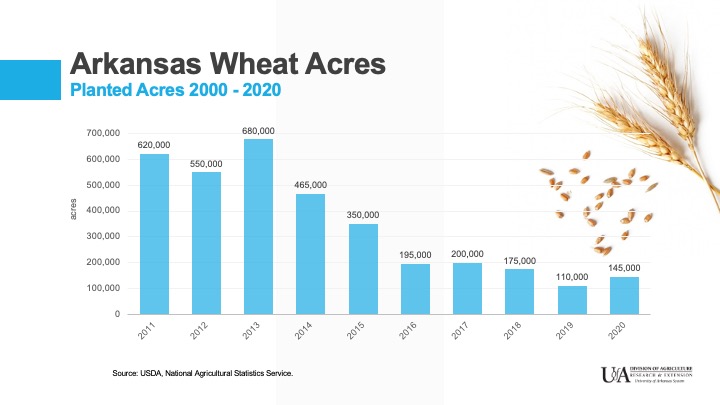Jan. 13, 2021
Arkansas winter wheat acres highest in four years
By Ryan McGeeney
U of A System Division of Agriculture
Fast Facts:
- Arkansas growers seeded 180,000 acres of winter wheat for harvest in 2021
- Higher market prices likely drove expanded acreage
- Nationwide, wheat up 5 percent to 32 million acres
(389 words)
(Download this story in MS Word format here.)
LITTLE ROCK — Arkansas producers planted about 180,000 acres of winter wheat in the fall of 2020, according to a report released Tuesday by the U.S. Department of Agriculture. The acreage is the highest for the state since 2017, when growers planted about 200,000 acres.
While the acreage represents an increase of more than 24 percent over 2019’s plantings, Arkansas wheat acreage is still a fraction of what it was less than a decade ago, when growers planted about 680,000 acres in 2013.
Winter wheat seedings also increased modestly nationwide, rising 5 percent over 2019 acreage to just shy of 32 million acres.
Scott Stiles, extension economist for the University of Arkansas System Division of Agriculture, said the increase in grain prices over the last several months likely contributed to growers’ decision to plant more winter wheat.
“Like corn and soybeans, wheat prices have struggled the last few years,” Stiles said. “The average producer price for wheat from 2016 to 2019 was $4.71. In most share lease arrangements, our growers need a price of $5.50 or better to cover input costs.”
Stiles said that growers typically sell a given year’s crop based on price signals from the Chicago Mercantile Exchange — in this case, the 2021 crop will be based on the CME July 2021 futures contract.
“During the month of October, the July contract traded in a range of $5.69 to $6.25,” Stiles said. “Futures continued to trade in a similar price range in November. Since then, the July contract has continued higher, trading to $6.60 this week, the highest level since December 2014.”
Jason Kelley, extension wheat and feed grains agronomist for the Division of Agriculture, said the wet weather, endemic to much of 2020, combined with limited seed availability, ultimately capped the state’s total wheat production.
“I thought we might have been able to get a few more acres of wheat planted this year, but in a lot of areas the weather was a limiting factor and only allowed a narrow window to get wheat planted, and getting summer crops harvested took priority,” Kelley said. “With the reduced wheat acres the past few years, there was also a limited amount of seed for planting, which may have also limited planting.”
Kelley said that recently planted wheat acres in Arkansas appear to be off to a good start.
To learn more about extension programs in Arkansas, contact your local Cooperative Extension Service agent or visit www.uaex.uada.edu. Follow us on Twitter at @UAEX_edu.
About the Division of Agriculture
The University of Arkansas System Division of Agriculture’s mission is to strengthen agriculture, communities, and families by connecting trusted research to the adoption of best practices. Through the Agricultural Experiment Station and the Cooperative Extension Service, the Division of Agriculture conducts research and extension work within the nation’s historic land grant education system.
The Division of Agriculture is one of 20 entities within the University of Arkansas System. It has offices in all 75 counties in Arkansas and faculty on five system campuses.
Pursuant to 7 CFR § 15.3, the University of Arkansas System Division of Agriculture offers all its Extension and Research programs and services (including employment) without regard to race, color, sex, national origin, religion, age, disability, marital or veteran status, genetic information, sexual preference, pregnancy or any other legally protected status, and is an equal opportunity institution.
# # #
Media contact:
Ryan McGeeney
Communications Services
University of Arkansas System Division of Agriculture
Cooperative Extension Service
(501) 671-2120
rmcgeeney@uada.edu
